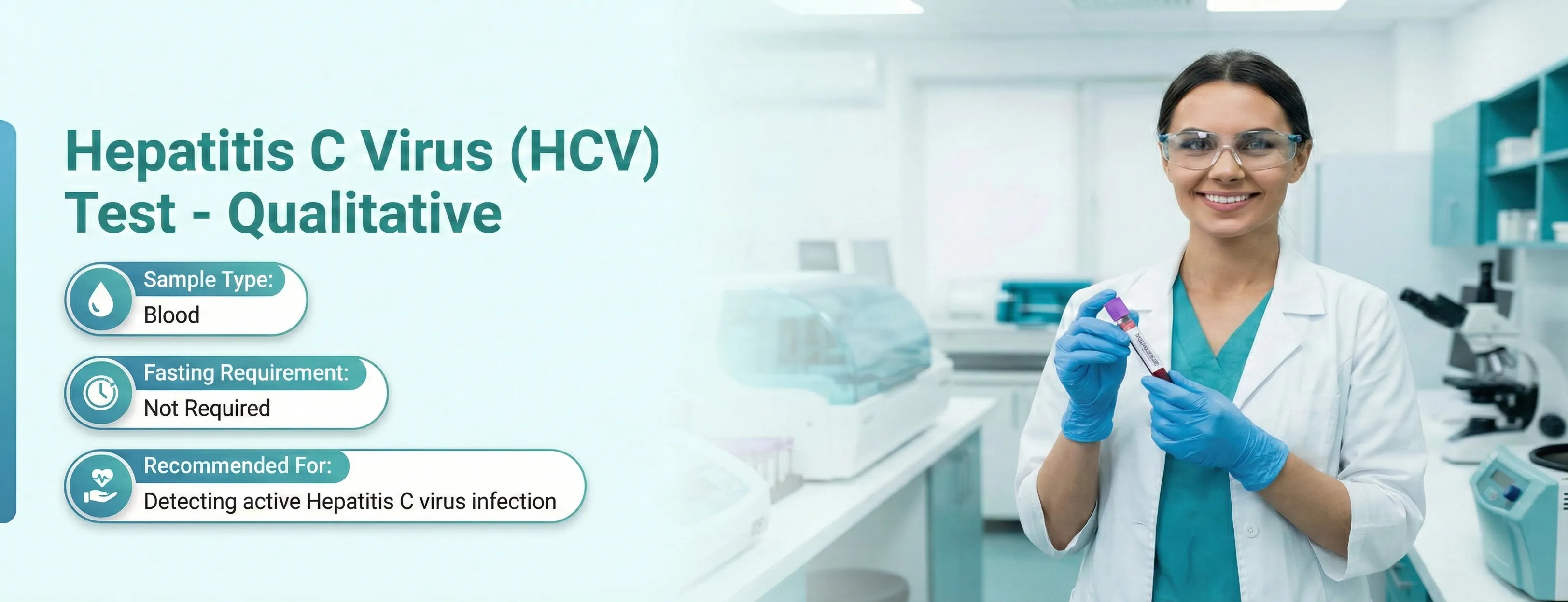17+ orders placed in your location
100% NABL & ISO Certified Lab • 100% Accurate Reports
Hepatitis C Virus (HCV) Test - Qualitative
Hepatitis C virus RNA PCR test, Hepatitis C RNA qualitative assay, Nucleic acid test for HCV infection, HCV RNA, anti-HCV test, NAT, Serologic test, PCR test
- SummaryThe Hepatitis C Virus (HCV) Test - Qualitative detects the presence of Hepatitis C virus RNA in the blood, confirming an active infection. It is used to diagnose Hepatitis C and monitor treatment response. A blood sample is required, no fasting is needed, and it is suitable for individuals of all age groups and genders as advised by a doctor.Read more
- Reports Within33 HrsView Sample Report100% NABL & ISO Certified Labs
- SampleBlood
- AgeAll Age Group
- GenderMale and Female
- FastingNot Required
PharmEasy Promises
Know More About The Test
A quick info on Hepatitis C Virus (HCV) Test - Qualitative
Overview
Hepatitis C virus causes Hepatitis C infection, which is basically an inflammation of the liver. Hepatitis C can be acute (short duration) or chronic (long duration), with infections ranging from mild to severe. For its diagnosis, firstly, the HCV antibody test is performed, which indicates the presence of HCV antibodies in the body. When this comes positive, an HCV RNA test is carried out, which indicates whether the infection is chronic or not.
HCV RNA tests are of two types: Qualitative HCV RNA test and Quantitative HCV RNA test. The qualitative test confirms the presence of the Hepatitis C virus in the body, whereas the quantitative test measures the amount of virus present. Then, the Genotype test is performed to determine the type of virus.
HCV tests are necessary to detect hepatitis C as, usually, the symptoms do not show up in case of a recent infection. Also, in the case of chronic Hepatitis, the symptoms sometimes show up decades after the infection and when it becomes serious. Acute infections are found in about 30% of the cases and they get cured within about six months after infection. 70% of the cases are found to be chronic and these turn severe in about 15-20% of people.
Hepatitis C is caused through contact with the blood of an infected person. Below are a few ways one could be infected:
- Sharing needles, injections, etc., to inject drugs.
- Usage of improperly sterilised needle/syringe.
- Unscreened blood/blood products transfusion.
- Tattoos or body piercings via non-sterile equipment.
- Passing of infection from mother to infant.
- Sharing of things like razors, nail cutters, toothbrushes, etc., where there is a chance to come in contact with infected blood.
- Having sexual intercourse with an HCV-infected person.
India shows about 1-1.9 % of HCV presence of the entire population. However, this reported prevalence could be incorrect due to a lack of proper data collection; the majority of data collected is from blood banks only and not the general population.
HCV infections are primarily present in people with HIV, sexually transmitted diseases, injection drug use, risky sexual behaviours and transfusions.
Risk Assessment
Acute HCV infection, Chronic HCV infection, Hepatitis C treatment assessment, Hepatitis C therapy decisions
What does this test detect?
HCV tests help check for the presence of Hepatitis C infection in a person. The antibody test identifies the presence of antibodies that indicate a recent or past infection. The HCV RNA test confirms the presence or absence of HCV in the body and signifies whether the infection is acute or chronic. The genotype test identifies the type of the virus.
Indications for Hepatitis C Test
The HCV test is ideally prescribed for people who:
- Inject drugs or used to inject drugs
- Are HIV positive
- Have had transfusions or transplants
- Have come in contact with the blood of an infected person
- Are children of an infected mother
- Suffer from liver disease or have abnormal liver tests
- Are receiving haemodialysis
- Are pregnant women
- Have had sexual intercourse with HCV-infected persons
- Are adults over 18 years
How frequently should you take this test?
If the HCV antibody test comes out negative, no further testing is recommended. If it shows a positive result, then an HCV RNA test is performed. Once the HCV antibody test comes positive, one need not take it again, as the result will always remain positive as the antibodies stay in the blood forever.
If the HCV RNA test result comes negative, then, too, no further tests are performed. If the HCV RNA test comes positive, the treatment for Hepatitis C is initiated, which ideally results in a cure in about 8-12 weeks. Further tests are carried out as per the suggestions of the medical professional.
Test Preparation
Before the Test
Your doctor will likely not request any special precautions before you take the HCV test. However, if you need to undergo this test along with another that requires fasting or preparation, you may be advised to fast for a specific time. Please contact your doctor for detailed information.
During the Test
During the HCV test, a blood sample from a vein in your arm will be drawn. Here are the consecutive steps:
- The potential puncture site will be cleansed using antiseptic solution.
- To make your veins stand out prominently, a tourniquet will be tied around your arm.
- A needle will be inserted into a vein to draw the blood. This can be accompanied by a brief pinch.
- The blood will be collected in a vial or small test tube, and a label with your details will be affixed to it.
After the Test
After the blood has been drawn:
- A bandage will be applied to stop the bleeding at the needle-insertion site.
- You may bruise at the puncture site. If you feel lightheaded (unusual side effect), rest for a few minutes till you feel better.
- If you experience persistent bleeding, pain, or if rashes erupt at the puncture site, contact your healthcare provider.
Parameters
Below is the parameter screened for in this test:
In HCV RNA test: Hepatitis C viral load. Once the antibodies are detected, this test is performed, through which the presence or absence of virus is detected.
Ranges
HCV Antibody Test:
Test Result | Indicates | Significance |
Negative or non-reactive HCV antibody test | No presence of antibodies | Not infected with HCV |
Positive or reactive HCV antibody test | Antibodies present | Have been infected with HCV sometime in the past, but it does not mean one is infected at present. |
HCV RNA Qualitative Test:
Test Result | Indicates | Significance |
Not detected HCV RNA | Hepatitis C Virus is not present in the body. | One is not infected by HCV at present as the infection is cured. |
Detected HCV RNA | HCV is present in the body. | One is currently infected and should consult a doctor for treatment. |
HCV RNA Quantitative Test:
Test Result | Interpretation |
Quantifiable load of the virus | One is currently infected |
Detected | The virus is present in the body but at a quantity that cannot be measured accurately; thus, the quantity of the virus is very low. |
Load of the virus found lesser than the lower limit | The virus is not present in the body |
The normal values and reference ranges of the test may vary from lab to lab. Please refer to the ranges mentioned in the report and consult a doctor to understand the interpretation of lab reports.
Test Result Interpretation
HCV testing involves testing for HCV antibodies, wherein a negative test result means that no antibodies are present in the body, indicating the person was never infected with HCV. If the result comes positive, then antibodies are present in the person and infection has occurred in the past, but this does not indicate current infection. If the results of the HCV antibody test come positive, then the HCV RNA test is suggested.
In the HCV RNA test, if HCV is not detected, there is no Hepatitis C Virus in the body. So the person is cured of the infection or the infection got treated naturally. If HCV RNA is detected, the HCV is present in the body and there is active infection; the person should seek medical help immediately.
Once the HCV RNA test comes positive, a Genotype test is performed to confirm the type of HCV. The HCV is of 6 types and 30 subtypes. This detection helps decide the course of treatment and check treatment response.
Risks and Limitations
The HCV test, a commonly performed blood test, carries very few risks of complications. Consult your physician if you experience:
- Persistent bleeding at the puncture site
- Redness, swelling, or pain at the needle insertion site.
Limitations of the test
- Potential inaccuracies due to equipment malfunction or human error
- Misinterpretation of markers which may lead to an inaccurate reading and report.
Was This Test Information Helpful?
Please rate your experience
References
People Also Ask
What is HCV's normal range?
Why is the HCV test done?
What is the HCV ratio?
What if the anti-HCV test is positive?
Have any doubts? Ask us.
Ask us anything about the Hepatitis C Virus (HCV) Test - Qualitative to understand it better
We provide trusted, expert-curated health content to support better awareness,prevention, and care.
Backed by experienced doctors, medical experts, and strict editorial standards.

